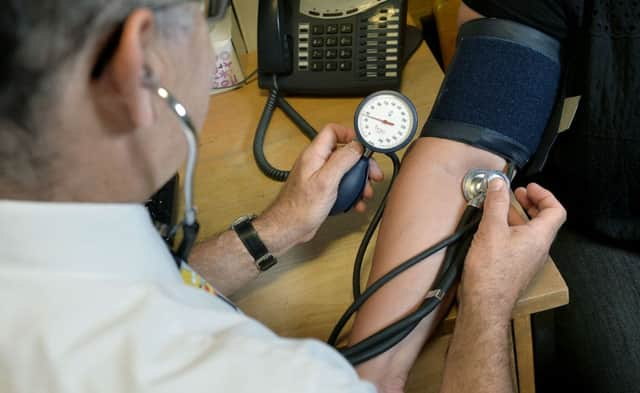Pioneering ultrasound trial giving Yorkshire woman with out-of-control blood pressure hope of a cure


Over the years the grandmother-of-two, 76, from Bedale, has been on 27 different forms of medication and changed her lifestyle in a fruitless effort to cure what seems an incurable problem that means the threat of a stroke or heart attack looms large.
But amid fears that her out-of-control hypertension could kill her, she has become one of the first people in the UK to undergo groundbreaking ultrasound therapy in a new clinical trial.
Advertisement
Hide AdAdvertisement
Hide AdThe Wave IV trial is a global study pioneering the use of ultrasound beams in tackling the problem for those who do not respond to medication. It is hoped the results will one day see the treatment approved for NHS use.
The treatment involves using ultrasound energy to disrupt nerves in the kidney, said to be at the heart of blood pressure control, without the need for a catheter or surgery.
Mrs Blythman, a former local politician and retired crisis management counsellor, is used to taking on other people’s problems but having seen her grandmother suffer a debilitating stroke several years ago she has long worried about her own future.
“It’s a walking timebomb, people walk around and don’t even know they’ve got high blood pressure and they then collapse,” she said. “I know I’ve got it, it’s in my family and I’m trying to do something about it. It’s been hanging over me.”
Advertisement
Hide AdAdvertisement
Hide AdMrs Blythman’s condition once became so serious that after testing her blood pressure, a nurse refused to let her leave until she was seen by a GP. She had posted a worrying blood pressure reading of 209/110 – well above the 140/90 that the NHS deems as higher than average.
She is one of around 300 people to be involved in the latest trial by US firm Kona Medical.
NHS hospitals in London, Birmingham, Glasgow, Exeter, Southampton and Cardiff are involved as well as facilities in the US, New Zealand and Poland.
It follows earlier research that found three quarters of patients who received the innovative one-time, one-hour therapy experienced a meaningful reduction in their blood pressure.
Advertisement
Hide AdAdvertisement
Hide AdHalf of all patients on the randomised Wave IV trial will receive the treatment, while the other half will receive a placebo.
As a result Mrs Blythman, who is having check-ups with researchers every six weeks to monitor her condition, does not know if she will actually benefit.
But faced with medication that has repeatedly left her with side effects like eye inflammation, headaches and blurred vision, she is willing to take that gamble.
Claiming her GP is surprised she has not had a stroke already after a long history of high blood pressure, she said: “I don’t know if I have had the treatment, but I already feel better. Now I have gone through this exercise, I feel I have done my best.
Advertisement
Hide AdAdvertisement
Hide Ad“If I die tomorrow I am not going to worry about it – at least I have done something about it.”
The treatment is exciting medical professionals as an alternative to an invasive procedure that involves the use of a catheter to access the renal nerves, which can pose health risks by itself.
Dr Mel Lobo, principal investigator for the trial at St Bartholomew’s Hospital in London where Mrs Blythman was first treated in December, said the catheter treatment carries risks of burning surrounding arteries in the aim of attacking a quite remote target.
“High blood pressure is dangerous and causes heart attacks and failures,” he said. “When it comes down to it, there has got to be options when the tablets aren’t working and we see this as a very exciting option.”
Advertisement
Hide AdAdvertisement
Hide AdDr Lobo added: “The size of the blood pressure problem globally is enormous, more than one billion people globally have high blood pressure but less than five per cent of those people need this treatment.”
Patients needed to further study
NHS hospitals in England are still recruiting patients whose high blood pressure is not responding to medication for the Wave IV trial.
It is thought that the latest part of research into the drug could yield results by the end of the year if recruitment proves successful.
Patients eligible to take part must be aged 18 to 90, they must taking three or more prescription medications for high blood pressure and have a systolic blood pressure consistently higher than 160mmHg.
Hospitals in London, Birmingham, Glasgow, Exeter and Cardiff are involved.
Visit konamedical.com/current-clinical-studies for information.